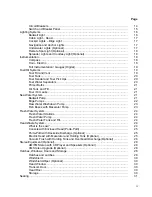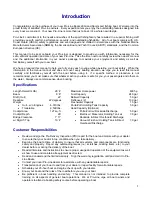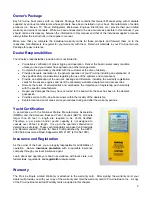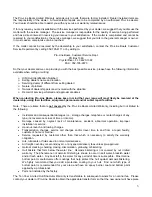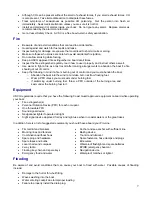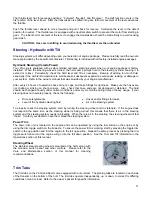
8
The boat will become flooded and may swamp, capsize or sink if water enters the boat faster than the bilge pump
can expel it.
Hazardous Conditions
Keep track of weather developments and avoid hazardous conditions whenever possible. When forced to
operate your Pro-Line in storm conditions:
•
Wear PFD's.
•
Stow loose gear and equipment.
•
Place heavy items as low as possible.
•
Head for the easiest port to reach a safe location.
•
Reduce speed. You are moving too fast if the boat leaves the water.
•
If power fails, anchor or rig a sea anchor off the bow (an empty ice chest in a pinch).
•
Stay with the boat if it capsizes, unless it is burning out of control.
Passenger Safety
You are responsible for the safety and conduct of your passengers. Make sure that:
•
You instruct your passengers on the proper use and location of PFD's. Children and non-
swimmers should wear one at all times.
•
Each passenger is in a safe location when underway and knows to keep the boat balanced.
•
At least one other person knows how to operate the boat in case of an emergency.
•
Your passengers are aware of propeller dangers and the possibility of sudden maneuvers and
jolts.
•
The
engine is turned off and the key is removed
when swimmers are near the prop or using
the dive platform.
•
All passengers keep away from lines under stress in case they break and recoil.
Regulations
The USCG is the authority of all waterways. Local authorities enforce State Boating Regulations. You are
subject to marine traffic laws and "Rules of the Road" for both federal and state waterways. Therefore, you must
submit to boarding if requested by the proper authority. There are many publications available from the Coast
Guard concerning regulations. Call the United States Coast Guard Info Line at (800)-368-5647 for additional
information.
Rules of the Road
Know and use the “Rules of the Road”. Your boat is subject to U.S. Coast Guard enforced marine traffic laws
known as “Rules of the Road.” There are two sets of rules: the US Inland Navigation Rules and the International
Rules. The latter rules are applicable to all vessels inside the demarcation lines separating inland and
international waters. You may obtain a copy of the rules from any of the following and by requesting the
publication titled “Navigational Rules, International - Inland.”
•
Your local USGC
•
The United States Coast Guard Info Line (800)-368-5647
•
The USCG Headquarters by logging on to uscg.mil
The information here is only a
“brief
” overview.
Please
contact the USCG for detailed information.
•
Audible warning signals:
o
One short horn blast: starboard course change.
o
Two short horn blasts: port course change.
o
Three short horn blasts: astern operation.
Summary of Contents for 2009 Grand Sport 29
Page 2: ...ii...




